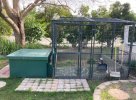lbailey4487
New Member
I am still educating myself, hoping to get my tort friend soon! I have some more set-up questions. Do I need to take the grass out of my tortoise’s enclosure and add substrate? The lawn area is fescue and mixed clover mainly. Is substrate necessary? How do I clean the outdoor enclosure? Do I need to replace the substrate regularly? Can the used substrate be composted for the flower beds later?
As to food, can Russian tortoises eat Timothy hay? I found some at Walmart made for guinea pigs that had dried, safe flowers mixed in. Would this be ok for them?
I appreciate any help! I want to do this right!
As to food, can Russian tortoises eat Timothy hay? I found some at Walmart made for guinea pigs that had dried, safe flowers mixed in. Would this be ok for them?
I appreciate any help! I want to do this right!
